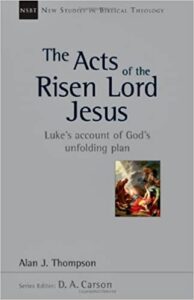
Book Review: The Acts of the Risen Lord Jesus
 When we study Acts, we often concentrate on such critical issues as the conversion stories, the Holy Spirit’s work, church government, and even missionary methods. While these issues should not be ignored, Alan J. Thompson suggests in The Acts of the Risen Lord Jesus that the emphasis of Acts is upon the continuing story of God’s saving purpose. He maintains that Luke intends for his work to be read in the light of Old Testament promises and the continuing reign of Christ in the inaugurated kingdom of God.
When we study Acts, we often concentrate on such critical issues as the conversion stories, the Holy Spirit’s work, church government, and even missionary methods. While these issues should not be ignored, Alan J. Thompson suggests in The Acts of the Risen Lord Jesus that the emphasis of Acts is upon the continuing story of God’s saving purpose. He maintains that Luke intends for his work to be read in the light of Old Testament promises and the continuing reign of Christ in the inaugurated kingdom of God.
Chapter one is entitled “Living ‘between the times’: the kingdom of God.” Thompson argues that the kingdom of God was inaugurated in the person of the Lord Jesus and continues to be administered through Him. He divides the kingdom into two stages: the “now” and the “not yet.” He believes the kingdom was inaugurated in Acts and will be consummated at the Lord’s Second Coming. Between the kingdom’s inauguration and its consummation, Jesus reigns as the Davidic king on God’s right hand. His pouring out of the Spirit and the gospel’s spread indicates His reign. This inaugurated kingdom is still to be understood as fulfilling God’s saving promises and plan.
In chapter two, entitled “The hope of Israel: the resurrection and the arrival of the last days,” Thompson focuses on the resurrection of Jesus and its role in announcing the arrival of the age to come, as anticipated in the Old Testament scriptures. He stresses that passages such as Luke 24 and Acts 23-28 teach that the Lord’s resurrection is the fulfillment of Israel’s hope. He says, “It is therefore, on the basis of the death and resurrection of Jesus, that the blessings of the age to come may be offered to all who come to the risen Lord Jesus in repentance and faith” (p. 99).
Chapter three, “Israel and the Gentiles: the kingdom and God’s promises of restoration,” highlights the truth that the restored kingdom of Israel (Acts 1:6) is actually the current kingdom of Christ. We should not look for a future restoration of the kingdom of Israel. Thompson says, “Gentiles are receiving God’s salvation not because God has failed to keep his word to Israel, nor because they must accept circumcision. Rather, Gentiles belong because God himself has included them by grace among his restored people by enabling them to hear the same good news of forgiveness of sins through faith in the crucified and risen Davidic king” (p. 124).
Chapter four is entitled “The promise of the Father: the gift of the Holy Spirit.” In this chapter, Thompson maintains that Luke’s teaching on the Holy Spirit in Acts is best understood within his explanation of the inaugurated kingdom of God. He summarizes this chapter, “The Lord Jesus has risen from the dead and is continuing to reign and administer God’s saving promises. The Holy Spirit has been poured out in fulfillment of God’s promises for the last days (Joel 2:28-29, Isa. 32:15, 44:3, Ezek. 37:14 de), and Jesus is the one who has sent the promised Spirit (Acts 2:33 de)“ (p. 143).
“The end of an era: the temple system and its leaders” is the title of chapter five. Luke’s emphasis on the enthronement of Jesus and the arrival of the last days in Acts 1-2 is immediately followed by a section (Acts 3-7) that deals with what would happen to the temple and Jewish leadership during the reign of Christ. Thompson points out that the reign of Jesus is universal; therefore, the temple and the Jewish leadership have served their purposes. Jesus even indicated that the Jerusalem temple was a temporary thing, and during His reign, it would no longer be needed (John 4:19-24). Thompson adds, “The Lord Jesus is therefore the fulfillment and replacement for the temple and the one through whom previous temple boundaries may not be overcome. The inadequacy of the temple is contrasted with the all sufficiency of the Lord Jesus; all of God’s blessings are found through faith in him” (p. 172).
Chapter six continues with the “end of an era” theme. It deals with the end of the law and is entitled “The end of an era: the law is no longer the direct authority for God’s people.” With the inauguration of the Messiah’s kingdom, His law, rather than that of Moses, becomes supreme. Moses even foretold that this would happen. He prophesied that God would raise a new prophet like him and God’s people should listen to him (Deut. 18:15-18). Peter tells us that this new prophet was Jesus (Acts 3:22). Thompson says, “Although not all questions concerning teaching and guidance for believers and the role of the Mosaic law are answered in Acts, the broad salvation-historical shift is clear” (p. 191). We are to listen to Jesus and His apostles and not the law of Moses.
The Acts of the Risen Lord Jesus is a profitable book. It is easy to read and helps the reader better understand the book of Acts in God’s plan of redemption. It stresses the theme of Acts: the resurrected Lord reigns.
Book Information
Author: Alan J. Thompson
Publisher: Inter Varsity Press
ISBN: 9780830826285
Originally Published: 2011
Book review written by: Doug Edwards | doug.deb.edwards@gmail.com